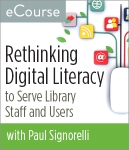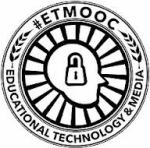There is no denying that playing and working in a variety of digital environments can sometimes feel akin to trying to drink out of a fire hose. There is also no denying that there’s another way to approach digital/online interactions: as if they produce magnificent waves well worth riding to a warm and welcoming shore—which pretty much describes the experiences I had riding rather than drowning in digital interactions last week as our ALA Editions four-week online course “Rethinking Digital Literacy” continued.
 While the learners I am supporting—and have, as an extension of what I have learned elsewhere, begun referring to as my “co-conspirators” —spent the second of four weeks trying to define and determine ways to foster digital literacy among those we serve, I continued engaging in my own efforts to see where a blend of onsite and online interactions involving a wide range of friends and colleagues might take me—a tremendously satisfying exercise that culminated in a richly rewarding conversation with T is for Training colleagues at the end of the week.
While the learners I am supporting—and have, as an extension of what I have learned elsewhere, begun referring to as my “co-conspirators” —spent the second of four weeks trying to define and determine ways to foster digital literacy among those we serve, I continued engaging in my own efforts to see where a blend of onsite and online interactions involving a wide range of friends and colleagues might take me—a tremendously satisfying exercise that culminated in a richly rewarding conversation with T is for Training colleagues at the end of the week.
Plenty of disparate elements had to come together for that particular wave to carry us all to shore, and they seemed to coalesce around a very specific digital-literacy skill: an ability to collaborate across numerous platforms and environments. The experience began early in the week as a local (San Francisco Bay Area) colleague (Clark Quinn), with whom I tend to interact more frequently online than face to face, was confirming lunch plans with me. Taking advantage of an hour-long trip via public transportation to reach Clark, I read several recent posts on his blog, where he consistently and engagingly addresses training-teaching-learning issues of interest to those of us working with adult learners in workplace learning and performance (staff training) settings. The punch line to one of his most recent posts—“…it’s not about content [in learning]. It’s about experience [in learning]. Are you designing experience?”—led to an intriguing conversation over lunch as I carried that online resource and inspiration into our face-to-face environment.
 But it didn’t stop there: I sensed there was plenty more to explore, and suspected a perfect venue drawing upon our digital literacy skill of collaborating within digital environments was back in the online sandbox I share with colleagues through Maurice Coleman’s biweekly T is for Training conversation/podcast—a program designed for those of us involved in library training-teaching-learning efforts. When Maurice and our T colleague Jill Hurst-Wahl agreed that Clark’s post and the question regarding content vs. experience would be a great topic for discussion, I notified Clark to see if he wanted to join us; he and I also continued the conversation briefly via exchanges in the weekly #lrnchat tweet chat (with an entirely different set of colleagues discussing tech trends) the night before the T is for Training was scheduled to take place.
But it didn’t stop there: I sensed there was plenty more to explore, and suspected a perfect venue drawing upon our digital literacy skill of collaborating within digital environments was back in the online sandbox I share with colleagues through Maurice Coleman’s biweekly T is for Training conversation/podcast—a program designed for those of us involved in library training-teaching-learning efforts. When Maurice and our T colleague Jill Hurst-Wahl agreed that Clark’s post and the question regarding content vs. experience would be a great topic for discussion, I notified Clark to see if he wanted to join us; he and I also continued the conversation briefly via exchanges in the weekly #lrnchat tweet chat (with an entirely different set of colleagues discussing tech trends) the night before the T is for Training was scheduled to take place.
Initially indicating he wouldn’t be available, Clark ultimately was able to join the conversation a few minutes after that episode of T began, and the results were every bit as stimulating as any of us might have hoped. A core group of the T “usual suspects” quickly welcomed Clark and interacted in ways that brought his non-library learning and development expertise to the forefront of the conversation; Clark, in turn, dove into the conversation in ways that helped him better understand how designing experiences in library training-teaching-learning efforts paralleled as well as differed from what he has seen elsewhere.
 By the end of the hour-long exchange, many things were obvious. The cross-pollination that occurs through interactions among members of various online communities—particularly the kind of online connected-learning communities with which I’m familiar—can bring benefits to everyone involved. This variation on hyperlinked learning—comprised of playing, learning, telling stories, transparency, participation, harnessing user-generated content (in this case, Clark’s blog post), and making connections, as Michael Stephens has suggested—benefits tremendously from our willingness to carry a variety of approaches into our continually evolving and ever-increasing tech tools. This combination of cross-pollination and hyperlinked learning produces notable results, small and large: T, for example, may have picked up a new usual suspect (if Clark is able to join us for additional conversations); Clark may be continuing the conversation in an upcoming Learnlet post to carry it to a larger audience; I’m certainly continuing this set of explorations further via my own blog and a tweet chat I’ll join later this week with #etmooc (Educational Technology & Media massive open online course) colleagues; and I will carry it back to the learners/co-conspirators in Rethinking Digital Literacy in the hope they can use it with their own colleagues in a number of different countries.
By the end of the hour-long exchange, many things were obvious. The cross-pollination that occurs through interactions among members of various online communities—particularly the kind of online connected-learning communities with which I’m familiar—can bring benefits to everyone involved. This variation on hyperlinked learning—comprised of playing, learning, telling stories, transparency, participation, harnessing user-generated content (in this case, Clark’s blog post), and making connections, as Michael Stephens has suggested—benefits tremendously from our willingness to carry a variety of approaches into our continually evolving and ever-increasing tech tools. This combination of cross-pollination and hyperlinked learning produces notable results, small and large: T, for example, may have picked up a new usual suspect (if Clark is able to join us for additional conversations); Clark may be continuing the conversation in an upcoming Learnlet post to carry it to a larger audience; I’m certainly continuing this set of explorations further via my own blog and a tweet chat I’ll join later this week with #etmooc (Educational Technology & Media massive open online course) colleagues; and I will carry it back to the learners/co-conspirators in Rethinking Digital Literacy in the hope they can use it with their own colleagues in a number of different countries.
Ultimately, this level of collaboration, designing learning experiences, and riding rather than drowning under waves of digital interactions and resources creates exactly the sort of learning experience I pictured when I read Clark’s blog post. More importantly, it supports our efforts to hone that very important digital-literacy skill of collaboration that, at its essence, supports the way we live, play, and work positively, creatively, and enthusiastically in a hyperlinked world.
N.B.: This is the third in a series of reflections inspired by our ALA Editions “Rethinking Digital Literacy” course.
